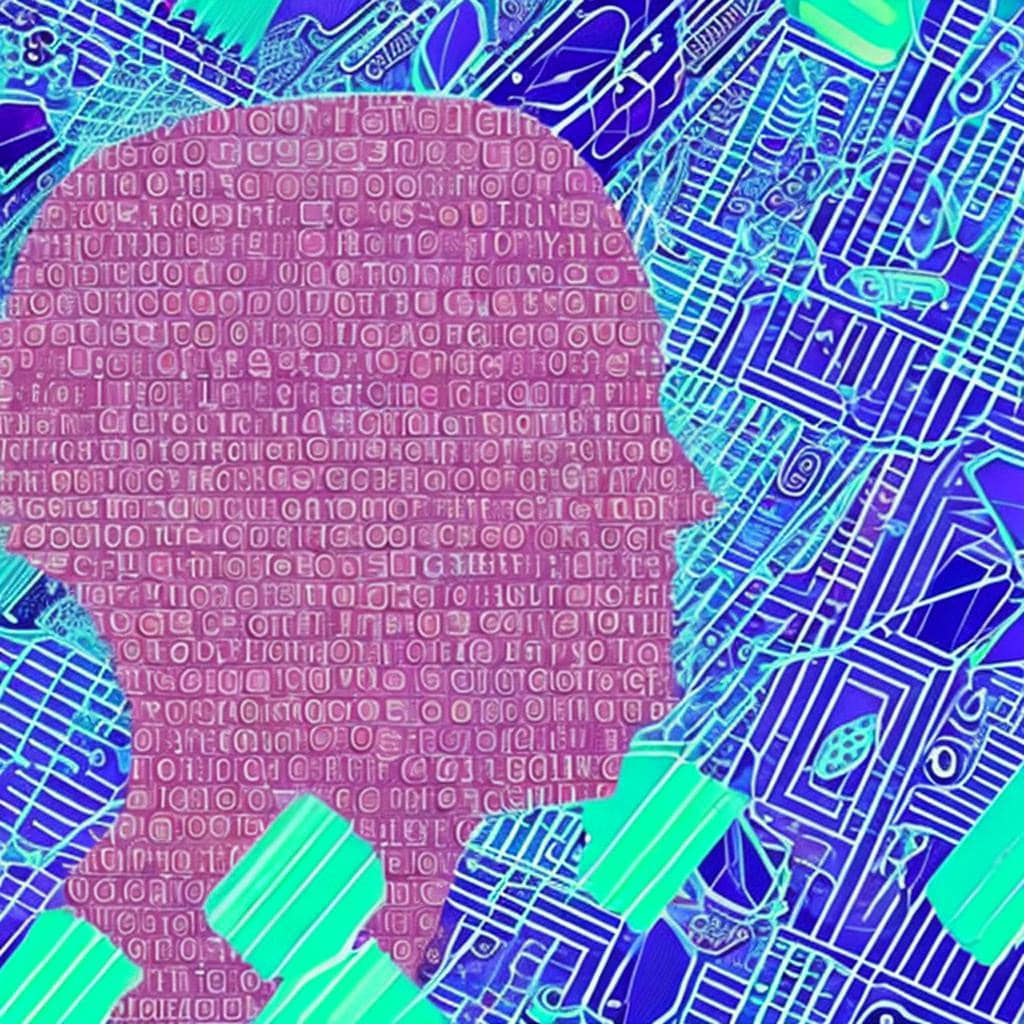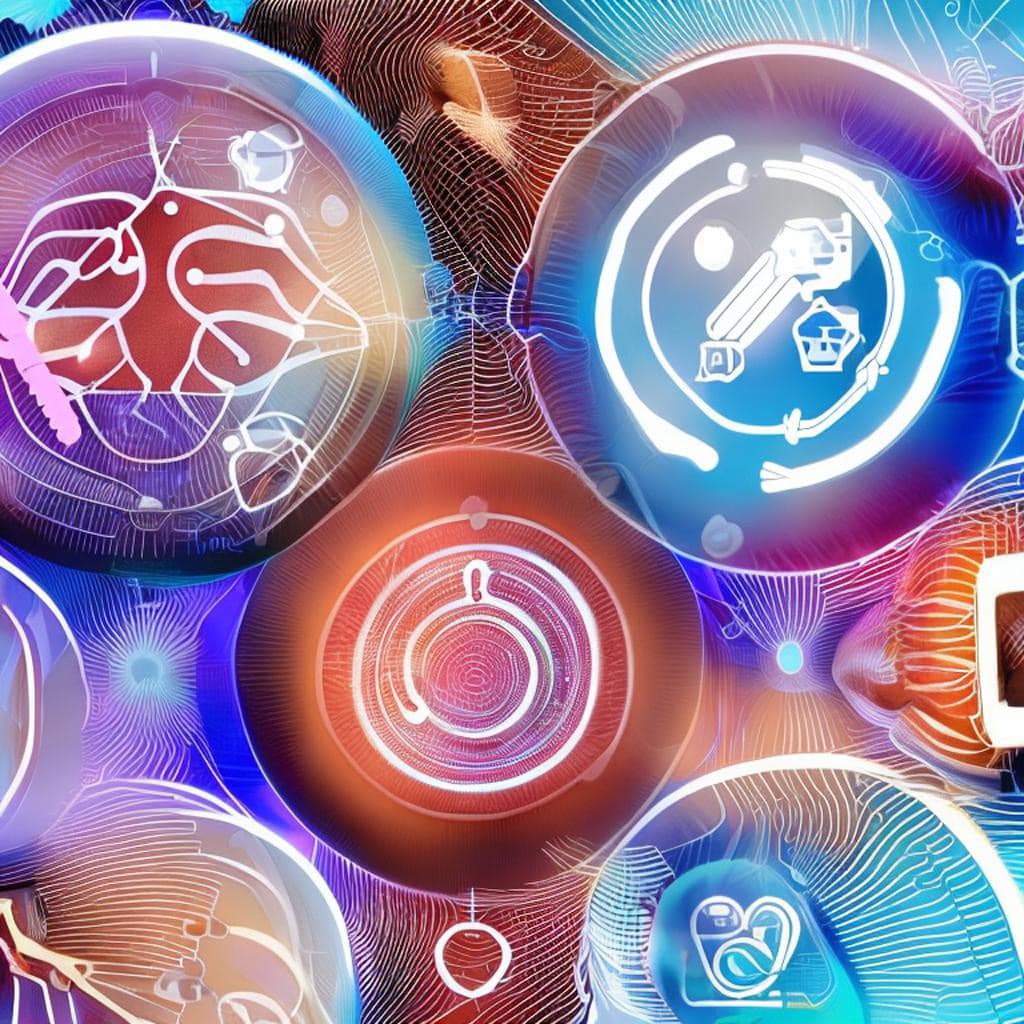AI transforming healthcare
Artificial Intelligence (AI) is transforming healthcare in numerous ways. From improved diagnostics to personalized treatment plans, AI is revolutionizing the industry by making it more efficient, accessible, and cost-effective. AI is a subset of computer science that uses algorithms to mimic human intelligence, and it has the ability to analyze and learn from data. This enables AI to make predictions and recommendations, as well as automate certain tasks that were once performed by humans.
One of the most significant contributions of AI to healthcare is in the area of diagnostics. AI algorithms are capable of analyzing medical images, such as X-rays, MRIs, and CT scans, and identifying abnormalities that might be missed by human radiologists. AI can also analyze medical records and patient histories to identify patterns and predict the likelihood of certain conditions, such as cancer or heart disease.
AI is also being used to develop personalized treatment plans. By analyzing patient data, AI algorithms can identify the most effective treatments for each individual. This can help doctors and healthcare providers make more informed decisions about which treatments to recommend, and can ultimately lead to better outcomes for patients.
Another area where AI is having a significant impact is in drug development. AI algorithms can analyze vast amounts of data, such as genetic information, medical records, and clinical trial results, to identify potential drug targets and develop more effective treatments. This can help to accelerate the drug development process and reduce the cost of bringing new drugs to market.
AI is also being used to improve the efficiency of healthcare systems. By automating certain tasks, such as appointment scheduling and prescription refills, AI can free up healthcare providers to focus on more complex tasks, such as diagnosis and treatment. AI can also help to reduce the administrative burden on healthcare providers by automating tasks such as billing and coding.
Despite the many benefits of AI in healthcare, there are also some challenges that must be addressed. One of the biggest challenges is ensuring the accuracy and reliability of AI algorithms. In order for AI to be effective, it must be trained on high-quality data and validated through rigorous testing. There is also a risk that AI could perpetuate biases that exist in the healthcare system, such as racial and gender biases.
Another challenge is ensuring that patients’ privacy and data security are protected. As AI relies on vast amounts of data, there is a risk that patient data could be compromised or misused. Healthcare providers and AI developers must take steps to ensure that patient data is kept secure and that patients’ privacy is protected.
AI is making a significant contribution to healthcare by improving diagnostics, developing personalized treatment plans, accelerating drug development, and improving the efficiency of healthcare systems. However, there are also challenges that must be addressed in order to ensure the accuracy and reliability of AI algorithms, protect patients’ privacy and data security, and ensure that AI does not perpetuate biases in the healthcare system. Despite these challenges, the potential benefits of AI in healthcare are enormous, and it is clear that AI will continue to play an increasingly important role in the future of healthcare.
Some questions regarding AI and healthcare
How is AI currently being used in healthcare, and what are the most promising applications of the technology?
AI is currently being used in healthcare in a variety of ways. One of the most promising applications is in diagnostics, where AI algorithms can analyze medical images, such as X-rays and MRIs, to identify abnormalities that might be missed by human radiologists. AI is also being used to analyze patient data, such as medical records and genetic information, to identify patterns and predict the likelihood of certain conditions.
Another application of AI in healthcare is in drug discovery, where AI algorithms can analyze vast amounts of data to identify potential drug targets and develop more effective treatments. AI is also being used to develop personalized treatment plans by analyzing patient data to identify the most effective treatments for each individual.
In addition, AI is being used to improve the efficiency of healthcare systems by automating certain tasks, such as appointment scheduling and prescription refills. This can free up healthcare providers to focus on more complex tasks, such as diagnosis and treatment.
The potential applications of AI in healthcare are vast, and the technology is already making a significant impact on the industry. However, there are also challenges that must be addressed to ensure the accuracy and reliability of AI algorithms and to guard against bias and discrimination in AI systems. Despite these challenges, the future of AI in healthcare looks very promising, and we can expect to see continued advancements in this area in the years to come.

What are some of the biggest challenges facing the adoption of AI in healthcare, and how can they be addressed?
There are several challenges facing the adoption of AI in healthcare, including:
Data quality and accessibility
In order for AI algorithms to be effective, they require high-quality data to be trained on. However, much of the data used in healthcare is unstructured or difficult to access, which can make it challenging to develop accurate and reliable AI algorithms.
Bias and discrimination
There is a risk that AI algorithms could perpetuate biases that exist in the healthcare system, such as racial and gender biases. This can lead to disparities in healthcare outcomes and must be addressed to ensure that AI is used in a fair and equitable manner.
Validation and testing
It is essential to validate and test AI algorithms to ensure their accuracy and reliability. However, this can be challenging, as the complexity of AI algorithms can make it difficult to understand how they arrive at their conclusions.
Privacy and security
As AI relies on vast amounts of data, there is a risk that patient data could be compromised or misused. Healthcare providers and AI developers must take steps to ensure that patient data is kept secure and that patients’ privacy is protected.
Education and training
Healthcare providers and organizations must be educated and trained on how to use AI effectively and safely. This includes understanding the limitations and potential biases of AI algorithms and being able to interpret and act on their results.
To address these challenges, healthcare providers and organizations must work closely with AI developers to ensure that AI is used in a responsible and effective manner. This includes investing in data infrastructure, developing policies and regulations to ensure the responsible use of AI, and providing education and training to healthcare providers and organizations. By addressing these challenges, we can unlock the full potential of AI in healthcare and improve patient outcomes while reducing costs.
How can we ensure that AI algorithms are accurate and reliable, and how can we guard against bias and discrimination in AI systems?
Ensuring the accuracy and reliability of AI algorithms and guarding against bias and discrimination are critical issues in the adoption of AI in healthcare. Here are some potential ways to address these challenges:
Data quality and transparency
To ensure the accuracy and reliability of AI algorithms, it is essential to use high-quality data and to be transparent about how the data is used. This includes ensuring that data is representative and free from bias and that the algorithms used are interpretable and explainable.
Fairness and bias mitigation
To guard against bias and discrimination in AI systems, it is essential to ensure that the algorithms used are fair and transparent. This includes testing algorithms for bias and taking steps to mitigate any biases that are identified.
Validation and testing
To ensure the accuracy and reliability of AI algorithms, it is essential to validate and test them rigorously. This includes conducting clinical trials and other tests to ensure that the algorithms are effective and safe.
Ethics and accountability
To ensure the responsible use of AI in healthcare, it is essential to establish ethical guidelines and standards for the use of AI. This includes establishing accountability frameworks to ensure that those responsible for developing and using AI algorithms are held accountable for their actions.
Privacy and security
To ensure that patients’ privacy and data security are protected, healthcare providers and AI developers must take steps to ensure that patient data is kept secure and that patients’ privacy is protected. This includes using secure data storage and transmission systems and complying with relevant regulations and standards.
By addressing these challenges, healthcare providers and organizations can ensure that AI is used in a responsible and effective manner, leading to better outcomes for patients while reducing costs.
What are the potential benefits of using AI in drug discovery, and how can AI help to accelerate the development of new drugs?
The potential benefits of using AI in drug discovery are enormous, and AI is already being used in a variety of ways to accelerate the development of new drugs. Here are some potential benefits of using AI in drug discovery:
Identifying new drug targets
AI algorithms can analyze vast amounts of data to identify potential drug targets that might be missed by traditional drug discovery methods. This can help to accelerate the discovery of new drugs and reduce the cost of drug development.
Improving drug efficacy
AI algorithms can analyze patient data to identify the most effective treatments for each individual, leading to more personalized and effective treatments.
Optimizing clinical trials
AI algorithms can help to design more efficient and effective clinical trials by identifying patient populations that are most likely to respond to a particular treatment and predicting the outcomes of different trial designs.
Reducing costs
By accelerating the drug discovery process and improving the efficiency of clinical trials, AI can help to reduce the cost of bringing new drugs to market.
Enhancing safety
AI can help to identify potential safety issues with new drugs by analyzing data from preclinical and clinical trials, leading to safer and more effective treatments.
The potential benefits of using AI in drug discovery are significant, and we can expect to see continued advancements in this area in the years to come.
How can AI be used to improve patient outcomes and reduce healthcare costs, and what role will AI play in the future of healthcare?
AI has the potential to improve patient outcomes and reduce healthcare costs by enabling more efficient and effective healthcare delivery. Here are some ways that AI can be used to achieve these goals:
Personalized treatment
AI algorithms can analyze patient data, such as medical records and genetic information, to develop personalized treatment plans that are tailored to each individual’s unique needs. This can lead to more effective treatments and better outcomes for patients.
Improved diagnostics
AI algorithms can analyze medical images and other diagnostic data to identify abnormalities and diagnose diseases more accurately and quickly than traditional methods. This can lead to earlier detection and treatment of diseases, improving patient outcomes.
Automated processes
AI can be used to automate certain processes, such as appointment scheduling, prescription refills, and billing and coding, freeing up healthcare providers to focus on more complex tasks, such as diagnosis and treatment. This can improve the efficiency of healthcare delivery and reduce costs.
Predictive analytics
AI can be used to analyze patient data and predict the likelihood of certain conditions, enabling healthcare providers to take preventative measures and reduce the risk of disease or complications. This can lead to better outcomes for patients and reduced healthcare costs.
Remote monitoring
AI can be used to remotely monitor patients and analyze data from wearable devices and other sensors, enabling healthcare providers to detect potential issues before they become serious and providing patients with more personalized care.
The potential benefits of using AI in healthcare are significant, and the technology is already making a significant impact on the industry. By leveraging the power of AI, we can improve patient outcomes, reduce healthcare costs, and create a more efficient and effective healthcare system.
What are the ethical considerations surrounding the use of AI in healthcare, and how can we ensure that patients’ privacy and data security are protected?
Ethical considerations surrounding the use of AI in healthcare are an important topic of discussion. Here are some key ethical considerations:
Privacy and data security
Healthcare providers and AI developers must ensure that patient data is kept secure and that patients’ privacy is protected. This includes complying with relevant regulations and standards, using secure data storage and transmission systems, and taking steps to prevent data breaches.
Bias and discrimination
There is a risk that AI algorithms could perpetuate biases that exist in the healthcare system, such as racial and gender biases. Healthcare providers and AI developers must work to ensure that AI is used in a fair and equitable manner, testing algorithms for bias and taking steps to mitigate any biases that are identified.
Informed consent
Patients have the right to understand how their data is being used and to provide informed consent for its use. Healthcare providers and AI developers must ensure that patients are informed about how their data is being used and have the opportunity to provide consent or opt-out of data collection.
Transparency and accountability
Healthcare providers and AI developers must be transparent about how AI algorithms are developed and used and be accountable for their actions. This includes establishing accountability frameworks to ensure that those responsible for developing and using AI algorithms are held accountable for their actions.
Autonomy and decision-making
The use of AI in healthcare raises questions about the role of healthcare providers and the autonomy of patients. Healthcare providers and AI developers must ensure that patients remain in control of their healthcare decisions and that AI is used to support and augment healthcare providers’ decision-making rather than replace it.
Ethical considerations are an important aspect of the adoption of AI in healthcare, and healthcare providers and organizations must take steps to ensure that AI is used in a responsible and ethical manner, protecting patients' privacy and data security, addressing bias and discrimination, and ensuring transparency and accountability.
What impact will AI have on healthcare jobs, and how can healthcare professionals prepare for the increasing use of AI in their work?
The increasing use of AI in healthcare is likely to have an impact on healthcare jobs, and healthcare professionals must prepare for this change. Here are some potential ways that AI could impact healthcare jobs:
New job roles
The adoption of AI in healthcare is likely to create new job roles, such as AI specialists, data analysts, and clinical data scientists. Healthcare professionals with skills in data analysis and computer science are likely to be in high demand.
Changing job responsibilities
Healthcare professionals’ job responsibilities are likely to change as AI is increasingly used to automate certain tasks, such as appointment scheduling and prescription refills. Healthcare professionals may need to develop new skills, such as data analysis and computer literacy, to adapt to these changes.
Enhanced decision-making
AI can provide healthcare professionals with more data and insights to support decision-making, improving the quality of care provided to patients.
Increased efficiency: AI can automate certain tasks and improve the efficiency of healthcare delivery, reducing the workload of healthcare professionals and enabling them to focus on more complex tasks.
Disruption and job loss
The adoption of AI in healthcare could lead to job loss in certain areas, such as medical coding and transcription. Healthcare professionals in these areas may need to consider retraining or transitioning to other roles.
The increasing use of AI in healthcare is likely to have a significant impact on healthcare jobs, and healthcare professionals must prepare for this change by developing new skills and adapting to new job roles and responsibilities. By embracing the potential of AI in healthcare, healthcare professionals can improve the quality of care provided to patients and create a more efficient and effective healthcare system.
How can governments and healthcare organizations promote the responsible use of AI in healthcare, and what policies and regulations are needed to ensure that AI is used in a safe and effective manner?
The responsible use of AI in healthcare requires the development of policies and regulations to ensure that AI is used in a safe and effective manner. Here are some potential policies and regulations that could promote the responsible use of AI in healthcare:
Data privacy and security regulations
Regulations that ensure patient data is kept secure and that patients’ privacy is protected are essential to the responsible use of AI in healthcare. These regulations should establish standards for data encryption, access control, and data retention.
Fairness and bias mitigation guidelines
Guidelines that ensure that AI algorithms are fair and transparent and that bias is mitigated are essential to the responsible use of AI in healthcare. These guidelines should establish standards for testing algorithms for bias and ensuring that any identified biases are addressed.
Standards for data quality and transparency
Standards that ensure that AI algorithms are developed and tested using high-quality data and that the data used is transparent and interpretable are essential to the responsible use of AI in healthcare.
Ethical guidelines for AI development and use
Ethical guidelines that establish standards for the development and use of AI in healthcare are essential to ensuring that AI is used in a responsible and ethical manner. These guidelines should address issues such as informed consent, accountability, and transparency.
Education and training programs
Education and training programs that prepare healthcare professionals to use AI effectively and safely are essential to the responsible adoption of AI in healthcare. These programs should provide healthcare professionals with the skills and knowledge needed to understand the limitations and potential biases of AI algorithms and to interpret and act on their results.
The development of policies and regulations that promote the responsible use of AI in healthcare is critical to ensuring that the potential benefits of AI are realized while minimizing potential risks. By establishing clear standards and guidelines, we can ensure that AI is used in a safe and effective manner, leading to better outcomes for patients and a more efficient and effective healthcare system.
What are the potential future developments in AI and healthcare
Some potential future developments in AI and healthcare include:
Advancements in personalized medicine
AI has the potential to analyze vast amounts of patient data to develop more personalized treatments that are tailored to each individual’s unique needs. As AI technology continues to evolve, we can expect to see even more sophisticated algorithms that can analyze increasingly complex data sets to develop more targeted treatments.
Increased use of AI in drug discovery
AI is already being used to identify new drug targets and develop more effective treatments. In the future, we can expect to see even more advanced AI algorithms that can analyze vast amounts of data to develop new drugs more quickly and efficiently.
Expansion of telemedicine
AI can be used to remotely monitor patients and provide personalized care, enabling healthcare providers to deliver care to patients who are unable to travel to a healthcare facility. As telemedicine technology continues to improve, we can expect to see even more advanced AI algorithms that can provide more sophisticated diagnoses and treatment plans.
Improved patient outcomes and reduced costs
As AI is increasingly used to automate certain tasks and improve the efficiency of healthcare delivery, we can expect to see better patient outcomes and reduced healthcare costs. This could lead to more accessible and affordable healthcare for people around the world.
Integration of AI with other technologies
AI can be integrated with other emerging technologies, such as blockchain and the Internet of Things, to create even more sophisticated healthcare systems. For example, AI could be used to analyze data from wearable devices and other sensors to provide more personalized care to patients.
The potential future developments in AI and healthcare are vast and exciting, and we can expect to see continued advancements in this area in the years to come.
What are the challenges that must be addressed in order to fully realize the potential of AI in healthcare
There are several challenges that must be addressed in order to fully realize the potential of AI in healthcare. Here are some potential challenges:
Limited data access
In order for AI algorithms to be effective, they require large amounts of high-quality data. However, much of the data used in healthcare is siloed and difficult to access, which can make it challenging to develop accurate and reliable AI algorithms.
Regulatory barriers
The use of AI in healthcare is subject to a range of regulatory barriers, such as restrictions on the use of patient data and concerns over privacy and security. These barriers can make it difficult to develop and implement AI solutions in healthcare.
Concerns over accuracy and reliability
There are concerns that AI algorithms could produce inaccurate or unreliable results, which could have serious consequences for patient care. It is important to validate and test AI algorithms rigorously to ensure their accuracy and reliability.
Ethical concerns
There are concerns that AI could perpetuate biases and discrimination in the healthcare system. Healthcare providers and AI developers must work to ensure that AI is used in a fair and equitable manner, testing algorithms for bias and taking steps to mitigate any biases that are identified.
Integration with existing systems
Integrating AI with existing healthcare systems can be challenging, particularly when it comes to interoperability between different systems. Healthcare providers and AI developers must work to ensure that AI is seamlessly integrated with existing systems to avoid disruptions to patient care.
Addressing these challenges will require collaboration between healthcare providers, AI developers, regulators, and policymakers. By working together, we can unlock the full potential of AI in healthcare and create a more efficient, effective, and equitable healthcare system.
Table with questions, fields of application, potential outcomes, and challenges related to AI in healthcare
| Question | Field of application | Potential outcomes | Challenges |
| How can AI be used to improve diagnostics? | Medical imaging | Improved accuracy and speed of diagnosis, earlier detection of diseases | Limited access to high-quality data, concerns over accuracy and reliability |
| How can AI be used to personalize treatments? | Treatment planning | More effective and personalized treatments, improved patient outcomes | Limited access to high-quality data, concerns over privacy and data security |
| How can AI be used to improve drug discovery? | Pharmaceutical research | Faster and more efficient drug discovery, improved treatment options | Limited access to high-quality data, regulatory barriers |
| What are the ethical considerations surrounding the use of AI in healthcare? | Healthcare policy and ethics | Fair and equitable use of AI, privacy and data security, informed consent | Bias and discrimination, lack of transparency and accountability |
| How will the adoption of AI impact healthcare jobs? | Healthcare workforce | Creation of new job roles, changing job responsibilities, increased efficiency | Disruption and job loss in certain areas, need for retraining and reskilling |
| What are the potential future developments in AI and healthcare? | Healthcare technology and innovation | Advancements in personalized medicine, increased use of AI in drug discovery, improved patient outcomes | Limited access to high-quality data, regulatory barriers |
| What are the challenges that must be addressed in order to fully realize the potential of AI in healthcare? | Healthcare policy and implementation | Limited access to high-quality data, regulatory barriers, concerns over accuracy and reliability | Ethical concerns, integration with existing systems |
| How can AI be used to support remote patient monitoring? | Remote patient monitoring | More personalized and efficient care, earlier detection of health issues | Limited access to high-quality data, concerns over privacy and data security |
| How can AI be used to optimize clinical trials? | Clinical trials | More efficient and effective clinical trials, reduced cost of drug development | Limited access to high-quality data, regulatory barriers |
| How can AI be used to improve decision-making in healthcare? | Healthcare decision-making | More data and insights to support decision-making, improved patient outcomes | Concerns over accuracy and reliability, lack of transparency and accountability |
This is just an example and the questions, fields of application, potential outcomes, and challenges may vary depending on the context and specific area of healthcare being discussed.

The use of AI in diagnostics
The use of AI in diagnostics is a promising area of development in healthcare. AI can analyze vast amounts of patient data and medical images, providing healthcare professionals with more accurate and timely diagnoses. By improving the accuracy and speed of diagnostics, AI can help to identify diseases earlier, leading to better patient outcomes and potentially reducing healthcare costs by allowing for earlier treatment interventions. However, as with any new technology, it is important to ensure that AI is used in a responsible and ethical manner, taking into account issues such as bias and privacy concerns, and working to mitigate any potential negative impacts.
AI-based diagnostic apps and tools
There are several AI-based diagnostic apps and tools that are currently available or in development. These apps use AI algorithms to analyze patient data and provide diagnostic recommendations to healthcare providers. Some examples include:
Ada Health
This app uses AI algorithms to analyze patient symptoms and provide personalized diagnostic recommendations.
Buoy Health
This app uses AI algorithms to analyze patient symptoms and provide personalized recommendations for care, including self-care, telemedicine, and in-person care.
Your.MD
This app uses AI algorithms to analyze patient symptoms and provide personalized recommendations for care, including self-care and telemedicine.
SkinVision
This app uses AI algorithms to analyze images of skin lesions and provide recommendations for further evaluation or treatment.
Viz.ai
This app uses AI algorithms to analyze medical images, such as CT scans, and provide recommendations for the diagnosis and treatment of stroke.
While AI-based diagnostic apps and tools have the potential to improve the accuracy and speed of diagnoses, it is important to note that they are not a replacement for professional medical advice and should be used in conjunction with medical care. Additionally, the accuracy and reliability of these apps can vary, so it is important to do research and consult with healthcare professionals before relying on them for diagnostic purposes.
Table comparing the AI-based diagnostic apps and tools I mentioned earlier, along with their pros and cons and pricing information
| App/Tool | Pros | Cons | Pricing |
| Ada Health | Easy to use, personalized recommendations, good accuracy | Limited availability of diagnostic data, may require additional testing for confirmation | Free with limited features, or subscription-based |
| Buoy Health | Easy to use, personalized recommendations, provides a range of care options | Limited availability of diagnostic data, may require additional testing for confirmation | Free |
| Your.MD | Easy to use, personalized recommendations, good accuracy | Limited availability of diagnostic data, may require additional testing for confirmation | Free |
| SkinVision | Easy to use, can detect skin cancer early, provides recommendations for further evaluation or treatment | Limited availability of diagnostic data, may require additional testing for confirmation, requires a paid subscription for full features | Subscription-based |
| Viz.ai | Can analyze medical images quickly and accurately, can improve outcomes for stroke patients | Limited availability of diagnostic data, may require additional testing for confirmation, currently only available for stroke diagnosis | Pricing information not publicly available |
This information is based on publicly available information and may not be comprehensive or up-to-date. Additionally, the accuracy and reliability of these apps and tools can vary, and healthcare professionals should be consulted for proper diagnosis and treatment recommendations.

Management of medical records and follow-up care for patients
The use of AI in healthcare can also help with the management of medical records and follow-up care for patients. For example:
Electronic health records (EHRs)
AI algorithms can be used to analyze patient data in EHRs to identify patterns and predict potential health issues, allowing healthcare professionals to intervene earlier and provide more effective treatment.
Population health management
AI can be used to analyze data from large populations of patients to identify trends and develop strategies for improving overall health outcomes.
Patient monitoring
AI can be used to remotely monitor patients and provide alerts to healthcare providers if there are any changes in the patient’s condition that require attention.
Predictive analytics
AI algorithms can be used to predict the likelihood of readmissions or other adverse events, allowing healthcare providers to take preventive measures and provide targeted follow-up care.
By using AI to improve the management of medical records and follow-up care, healthcare providers can provide more personalized and effective care to their patients, leading to better health outcomes and potentially reducing healthcare costs by preventing complications and readmissions. However, as with any use of AI in healthcare, it is important to ensure that patient privacy and data security are maintained and that any potential negative impacts are mitigated.
What about AI and the categorization of herbs and their fields of application
AI can also be used to categorize herbs and their fields of application in traditional medicine. In traditional medicine, herbs have been used for centuries to treat various health conditions, but their efficacy and safety have not always been well understood. With the help of AI, it is possible to categorize herbs based on their chemical composition, biological activity, and traditional uses, which can help in the development of evidence-based therapies and improve patient outcomes.
For example, AI algorithms can be used to analyze data from multiple sources, including traditional medicine literature, scientific studies, and clinical trials, to identify the chemical compounds present in different herbs and their biological activities. This information can then be used to categorize herbs based on their therapeutic properties and fields of application.
By using AI to categorize herbs and their fields of application, traditional medicine practitioners and researchers can develop more targeted and effective therapies that are based on scientific evidence. However, it is important to ensure that the use of AI in traditional medicine is done in a responsible and ethical manner, taking into account cultural sensitivities and local knowledge. Additionally, traditional medicine practitioners should continue to work with healthcare providers to ensure that their patients receive safe and effective care.
AI being used to categorize herbs and their fields of application in traditional medicine
Yes, there are several examples of AI being used to categorize herbs and their fields of application in traditional medicine. Here are a few examples:
- A study published in the Journal of Ethnopharmacology in 2021 used machine learning algorithms to analyze data on 407 medicinal plants commonly used in traditional Chinese medicine. The study aimed to identify patterns in the chemical compounds present in these plants and their biological activities. The results of the study were used to develop a classification system for traditional Chinese medicinal plants based on their chemical composition and therapeutic properties.
- Another study published in the Journal of Traditional and Complementary Medicine in 2020 used a machine learning algorithm to analyze data on the traditional uses of 36 medicinal plants in Ghana. The algorithm was able to identify patterns in the traditional uses of these plants and categorize them based on their therapeutic properties.
- The World Health Organization (WHO) has also developed a classification system for traditional medicine practices, including the use of herbs. The system is based on a combination of traditional knowledge and scientific evidence, and is used to categorize traditional medicine practices based on their safety, efficacy, and quality.
These examples demonstrate the potential of AI to support the categorization of herbs and their fields of application in traditional medicine. However, it is important to note that the use of AI in traditional medicine is still a developing field, and more research is needed to fully understand its potential benefits and limitations. Additionally, the integration of AI with traditional medicine practices must be done in a culturally sensitive and ethical manner, taking into account local knowledge and practices.

Source OpenAI’s GPT language models, Fleeky, MIB, & Picsart
Thank you for questions, shares and comments!
Share your thoughts or questions in the comments below!






